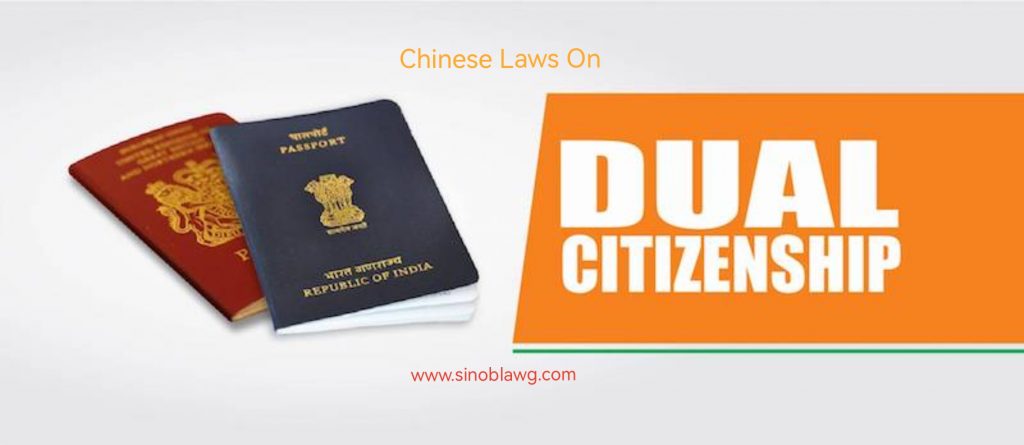Nationality is a hot topic on China social media. With so many Chinese people having emigrated or contemplating emigrating to foreign countries, their nationality is often a top concern. So it is important to know the rules under Chinese laws for determining nationality.
I. Basic Provisions of PRC Nationality Law
As you may have heard of, the Nationality Law of the People’s Republic of China (PRC) provides in its Article 3 that dual nationality of a Chinese citizen is not recognized in PRC. As always, when we talk about China or PRC, Hong Kong, Macau and Taiwan are three special regions and PRC laws may be varied and altered when applied therein.
In the spirit of Article 3 quoted above, Article 9 of PRC Nationality Law provides that A Chinese citizen who has settled in a foreign country shall lose its Chinese nationality automatically upon voluntarily acquiring or being granted foreign citizenship. This provision has a problem in its actual application in practice. Chinese citizens who have been naturalized into foreign citizenship often don’t report their naturalization to Chinese government, and China government has no means to know such changes. Thus, in reality, many Chinese citizens still hold their Chinese citizenship after becoming foreign nationals.
Besides the issue of dual nationality, there is also the nationality conflict issue arising from Article 4 and 5 of PRC Nationality Law. Article 4 says a person is a Chinese citizen if he or she is born within China and both or one of his or her parents is Chinese citizen. Article 5 provides that any person born abroad whose parents are both Chinese citizens or one of whose parents is a Chinese citizen shall have Chinese nationality. But a person whose parent(s) are Chinese citizens (or one of whose parents is Chinese citizen) and have (or has) settled abroad shall not have Chinese nationality if he or she has acquired foreign nationality at birth.
II. Dual Nationality
Dual nationality is often discussed among Chinese diaspora in the world. As said, China governments have no access to real time information about its citizens who turn into foreign nationals, which results in many Chinese citizens de facto having dual nationality. Sale and purchase of passports by offshore island countries like Caribbean states has fueled the phenomenon.
However, with bio-identification technologies introduced at national customs, some people may eventually be found to hold dual nationality. Recent years, China government esp police departments, has stepped up efforts to clean the mess demanding people who are found to have dual nationality to deregister their household registration and turn over China identity cards and documents. This has caused outcries among expat Chinese.
In China judicial system, China courts are serious about dual nationality. If a party to a litigation case is found to have foreign passport, he or she will not be treated as a Chinese citizen. Change of nationality of the party concerned could have important and complicated implications for case jurisdiction, and applicable laws to certain legal issues in the case. We have seen also cases where duly registered marriage was declared void by China courts simply because one party thereto concealed the fact that he had obtained foreign citizenship before but still used his China identity in registering their marriage.
III. Nationality Conflict
The provision of Article 4 and 5 of PRC Nationality Law has resulted in a phenomenon of conflict of nationality for newborns who are qualified to be granted two or more nationalities upon birth.
Indeed, there are so many so called “American babies” in China who were born in USA just for purpose of obtaining American citizenship while their parents are both Chinese citizens. Those children are entitled to Chinese nationality as well. Thus, those children automatically have both American and Chinese nationalities. In practice, China doesn’t take such phenomena of Chinese citizens holding two nationalities as “dual nationality” rather a nationality conflict, where the foreign nationality doesn’t negate Chinese nationality. On the other hand, Chinese consulates outside China are mandated to issue a so called “Travel Pass” to such children of nationality conflict for them to enter into China.
In cross-border divorce cases where such children having foreign nationalities are allowed to be registered in China household registration system, meaning they are granted Chinese nationality. Though those people of nationality conflict have a foreign nationality, they are treated as Chinese citizens within China and China government won’t make available right of foreign consular protection to those people of nationality conflict.
IV. Special Case of Hong Kong Citizens
Hong Kong is a specially administered region of China where a whole different set of laws and regulations are applied there. Legally speaking, a Hong Kong citizen is a
V. More Problems Ahead
Nationality has been and will surely remain a hot topic and complicated issue in China. When there are many in society who have dual nationalities (in particular rich Chinese who buy foreign passports for easier travel or other reasons) and who are caught in conflict of nationalities, China law should respond to the legal reality and accordingly revise its current old Nationality Law.
Time will tell what changes will come up in the future.





Comments